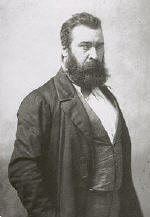
Jean-François Millet, who settled in Barbizon late in 1849, was born into a farming family. Trained with an academic painter in Paris, Millet devoted his early work to portraits and erotic nudes. He was sensitive to the changes brought about by the increasing urbanisation and industrialisation of France, and he was particularly inspired by the social issues raised by the Revolution of 1848. Thereafter he turned to scenes of peasants labouring, endowing them with heroic form adapted from the art of the past.
Unprecedented in French art, such works by Millet as The Sower were particularly controversial in the political climate of the time. Powerful and monumental, Millet's sower strides across a newly plowed field with energy and resolution, scattering the seeds for a new crop; he serves as an emblem of regeneration and of the elemental relationship between man and nature. Crude in appearance, the work provoked commentary not only on its subject matter but also on its styles and unorthodox technique. Théophile Gauteier, a famous nineteenth-century critic working for a government newspaper, noted that Millet "trowels on top of his dishcloth of a canvas, without oil or turpentine, vast masonries of coloured paint so dry that no varnish could quench its thirst". Political conservatives, who viewed the peasants as a potentially disruptive social element, attacked Millet, while liberals praised his ennoblement of rural life.
A nostalgia for an existence that was a dying phenomenon eventually made Millet's works some of the most famous images of their day. His paintings were exhibited widely, and he was revered on both sides of the Atlantic.
When Millet died in 1875, he was buried at Barbizon, next to Théodore Rousseau.